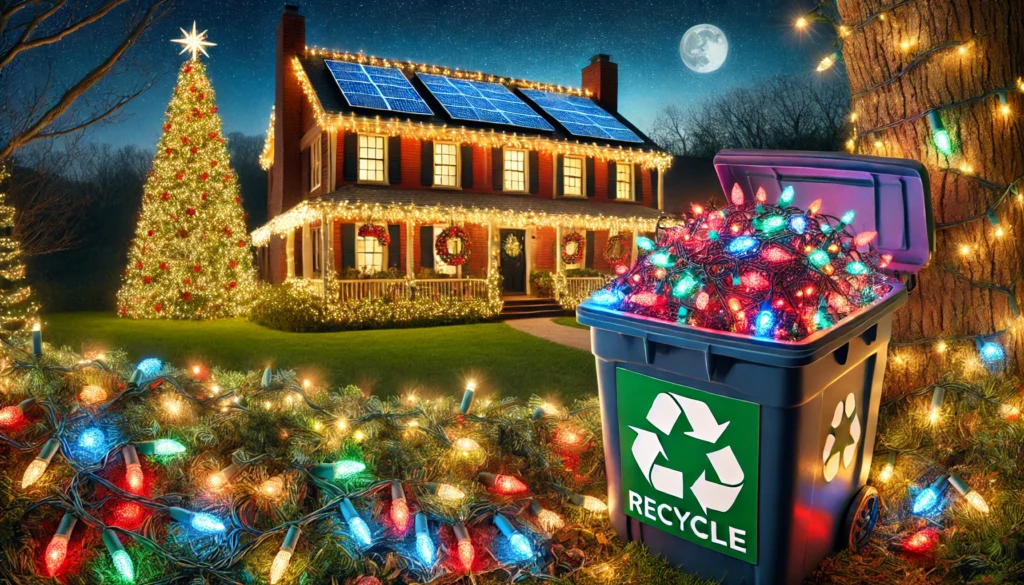Introduction
The holiday season is a time of joy, celebration, and beautiful decorations. However, traditional holiday lighting can come with a hefty environmental cost, from high energy consumption to wasteful practices. This year, why not spread holiday cheer in a more sustainable way?
Eco-friendly Christmas lighting is not only good for the planet but also for your wallet. By adopting energy-saving practices and making smarter lighting choices, you can enjoy a magical display while significantly reducing your carbon footprint. In this post, we’ll explore practical tips and tricks to create a dazzling, energy-efficient holiday display.
Section 1: The Environmental Impact of Traditional Christmas Lights
Decorating with traditional incandescent lights consumes a significant amount of electricity.
Key Stats:
- Traditional incandescent bulbs use about 90% more energy than modern LED lights. (Energy.gov)
- In the U.S. alone, holiday lighting contributes to a substantial increase in electricity usage, costing households millions of dollars every season. (Earth911)
Switching to energy-efficient alternatives can make a meaningful difference in reducing environmental impact while maintaining festive cheer.
Section 2: Eco-Friendly Christmas Lighting Tips
1. Opt for LED Lights
- Why LEDs?
LEDs (Light-Emitting Diodes) are up to 75% more efficient than traditional lights and last up to 25 times longer. - Bonus: They generate less heat, reducing the risk of fire hazards.
- Look for ENERGY STAR-rated LED lights for maximum efficiency.
2. Use Solar-Powered Lights
- Solar-powered string lights charge during the day and illuminate at night without using grid electricity.
- Ideal for outdoor decorations, these lights are cost-effective and sustainable.
3. Automate Lighting Schedules
- Use timers or smart plugs to ensure lights are only on during key hours, such as early evenings.
- Set lights to turn off automatically at bedtime, saving energy while you sleep.
4. Go Minimalist
- Less is More: Focus on strategic lighting to highlight key areas rather than overloading every inch of your space.
- Use fewer strands but with greater impact, such as wrapping lights around trees or outlining the roofline.
5. Recycle Old Lights
- Don’t throw away old or broken lights. Many recycling programs accept holiday lights and ensure proper disposal.
- Some retailers even offer discounts when you trade in old lights for new LED options.
6. Combine Lighting with Natural Decorations
- Incorporate reflective surfaces like mirrors or tinsel to amplify the glow without additional lights.
- Use candles or lanterns in safe, controlled settings to reduce electricity usage while adding a cozy ambiance.
Section 3: Addressing Common Misconceptions
Misconception: LEDs Are Too Expensive
- Reality: While LEDs have a higher upfront cost, their energy savings and longevity make them a cost-effective choice in the long run.
Misconception: Solar Lights Don’t Work in Winter
- Reality: Modern solar lights are designed to store enough energy even on cloudy days, making them suitable for winter use.
Section 4: Practical Steps to Start Today
- Audit Your Lights: Identify areas where you can replace or reduce lighting.
- Buy Energy-Efficient Options: Look for eco-friendly certifications on new lighting purchases.
- Recycle Responsibly: Find local programs or stores that accept old lights for proper recycling.
- Share the Knowledge: Encourage friends and family to adopt eco-friendly lighting practices.
Conclusion
This holiday season, let your decorations shine brightly without dimming the planet’s future. Eco-friendly Christmas lighting not only reduces energy consumption but also enhances the beauty of your home in a sustainable way. By switching to LEDs, using solar power, and embracing minimalist designs, you can create a festive display that reflects both holiday cheer and environmental responsibility.


